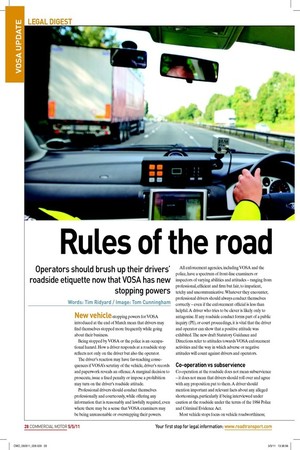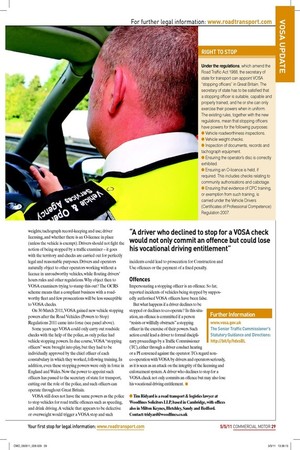Rules of the road
Page 24

Page 25

If you've noticed an error in this article please click here to report it so we can fix it.
Operators should brush up their drivers’ roadside etiquette now that VOSA has new stopping powers
Words: Tim Ridyard / Image: Tom Cunningham New vehicle-stopping powers for VOSA introduced at the end of March mean that drivers may ind themselves stopped more frequently while going about their business.
Being stopped by VOSA or the police is an occupational hazard. How a driver responds at a roadside stop relects not only on the driver but also the operator.
The driver’s reaction may have far-reaching consequences if VOSA’s scrutiny of the vehicle, driver’s records and paperwork reveals an offence. A marginal decision to prosecute, issue a ixed penalty or impose a prohibition may turn on the driver’s roadside attitude.
Professional drivers should conduct themselves professionally and courteously, while offering any information that is reasonably and lawfully required, even where there may be a sense that VOSA examiners may be being unreasonable or overstepping their powers. All enforcement agencies, including VOSA and the police, have a spectrum of front-line examiners or inspectors of varying abilities and attitudes – ranging from professional, eficient and irm but fair, to impatient, tetchy and uncommunicative. Whatever they encounter, professional drivers should always conduct themselves correctly – even if the enforcement oficial is less than helpful. A driver who tries to be clever is likely only to antagonise. If any roadside conduct forms part of a public inquiry (PI), or court proceedings, it is vital that the driver and operator can show that a positive attitude was exhibited. The new draft Statutory Guidance and Directions refer to attitudes towards VOSA enforcement activities and the way in which adverse or negative attitudes will count against drivers and operators.
Co-operation vs subservience
Co-operation at the roadside does not mean subservience – it does not mean that drivers should roll over and agree with any proposition put to them. A driver should mention important and relevant facts about any alleged shortcomings, particularly if being interviewed under caution at the roadside under the terms of the 1984 Police and Criminal Evidence Act.
Most vehicle stops focus on vehicle roadworthiness; weights; tachograph record-keeping and use; driver licensing, and whether there is an O-licence in place (unless the vehicle is exempt). Drivers should not ight the notion of being stopped by a trafic examiner – it goes with the territory and checks are carried out for perfectly legal and reasonable purposes. Drivers and operators naturally object to other operators working without a licence in unroadworthy vehicles, while louting drivers’ hours rules and other regulations. Why object then to VOSA examiners trying to stamp this out? The OCRS scheme means that a compliant business with a roadworthy leet and few prosecutions will be less susceptible to VOSA checks.
On 30 March 2011, VOSA gained new vehicle stopping powers after the Road Vehicles (Powers to Stop) Regulations 2011 came into force (see panel above).
Some years ago VOSA could only carry out roadside checks with the help of the police, as only police had vehicle stopping powers. In due course, VOSA “stopping oficers” were brought into play, but they had to be individually approved by the chief oficer of each constabulary in which they worked, following training. In addition, even these stopping powers were only in force in England and Wales. Now the power to appoint such oficers has passed to the secretary of state for transport, cutting out the role of the police, and such oficers can operate throughout Great Britain.
VOSA still does not have the same powers as the police to stop vehicles for road trafic offences such as speeding, and drink driving. A vehicle that appears to be defective or overweight would trigger a VOSA stop and such incidents could lead to prosecution for Construction and Use offences or the payment of a ixed penalty.
Offences
Impersonating a stopping oficer is an offence. So far, reported incidents of vehicles being stopped by supposedly authorised VOSA oficers have been false.
But what happens if a driver declines to be stopped or declines to co-operate? In this situation, an offence is committed if a person “resists or willfully obstructs” a stopping oficer in the exercise of their powers. Such action could lead a driver to formal disciplinary proceedings by a Trafic Commissioner (TC), either through a driver conduct hearing or a PI convened against the operator. TCs regard nonco-operation with VOSA by drivers and operators seriously, as it is seen as an attack on the integrity of the licensing and enforcement system. A driver who declines to stop for a VOSA check not only commits an offence but may also lose his vocational driving entitlement. ■
● Tim Ridyard is a road transport & logistics lawyer at Woodines Solicitors LLP, based in Cambridge, with ofices also in Milton Keynes, Bletchley, Sandy and Bedford. Contact: tridyard@woodines.co.uk
















































